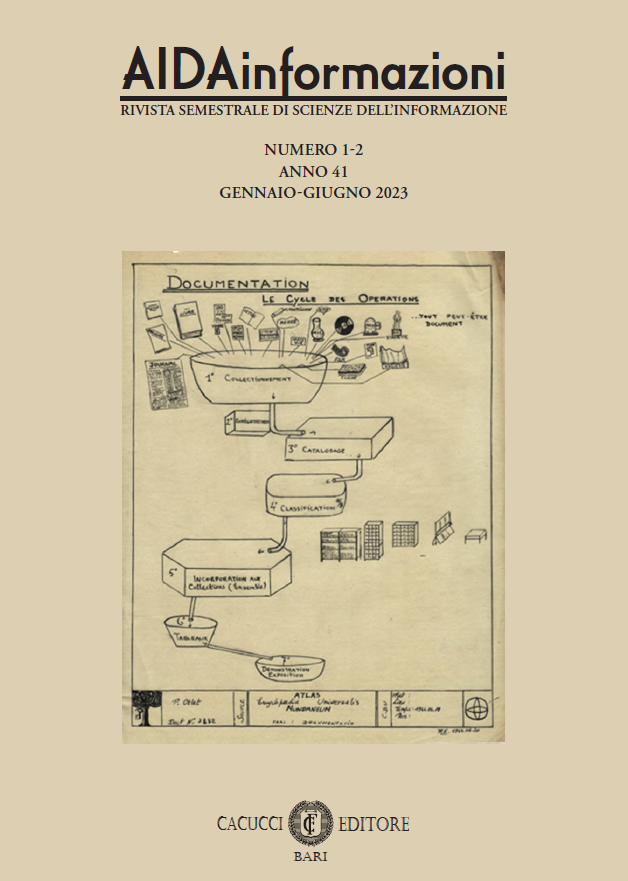Se l’archivio è artificiale.
Verso uno ius archivi partecipativo?
Parole chiave:
Invented archives, Participatory archives, Archival context, Archives, Digital archivesAbstract
The article, starting from consolidated methodological observations, aims to evaluate the concept of digital archive in a critical and comparative key, analyzing sedimentation processes that give rise to peculiar and “artificial” aggregations, such as invented archives and participatory archives. An attempt is also made to reflect on the consequences of the multiplication of potential producers and on the idea of democratization of history, with particular reference to the role of the archival discipline in these scenarios.
Riferimenti bibliografici
About, September 11 Digital Archive. n.d. Consultato il 30 maggio 2023. https://911digitalarchive.org/about.
Alaoui, Siham. 2019. Recensione di Participatory Archives: Theory and Practice, a cura di Edward Benoit e Alexandra Eveleigh. The American Archivist 83, no. 2 (fall/winter 2000): 470-74.
Balbi, Gabriele, e Peppino Ortoleva. 2023. La comunicazione imperfetta. Ostacoli, equivoci, adattamenti. Milano: Einaudi.
Benoit, Edward, and Alexandra Eveleigh. 2019. Participatory Archives: Theory and Practice, edited by Edward Benoit and Alexandra Eveleigh. London: Facet Publishing.
Bushey, Jessica. 2023. “A Participatory Archives Approach to Fostering Connectivity, Increasing Empathy, and Building Resilience during the COVID-19 Pandemic.” Heritage 2023 6(3): 2379-93. https://doi.org/10.3390/heritage6030125.
Catalani, Luigi, e Pierluigi Feliciati. 2018. “Wikipedia, le biblioteche e gli archivi / Wikipedia, Libraries and Archives.” JLIS.it 9 (3): I-III. https://doi.org/10.4403/jlis.it-12510.
Collections, September 11 Digital Archive. n.d. Consultato il 30 maggio 2023. https://911digitalarchive.org/collection-tree.
Cook, Terry. 2001. “Archival science and postmodernism: new formulations for old concepts.” Archival Science 1: 3-24. https://doi.org/10.1007/BF02435636.
Da Silveira, Pedro T. 2018. “From Instant History to the Infinite Archive: Digital Archiving, Memory and the Practical Past at the Roy Rosenzweig Center for History and New Media.” Historein, 17(2). https://doi.org/10.12681/historein.10964.
Fasano, Giusi. 2011. “Cronache.” Corriere della sera, 6 agosto 2011, 23, come citato in Treccani. n.d. “wiki-mondo.” Consultato il 30 maggio 2023. https://www.treccani.it/enciclopedia/wiki-mondo_%28altro%29/.
Frequently Asked Questions about 9/11, September 11 Digital Archive. n.d. Consultato il 30 maggio 2023. https://911digitalarchive.org/faqs#response.
Giannachi, Gabriella. 2021. Archiviare tutto. Una mappa del quotidiano. Torino: Treccani.
Gilliland, Anne J.,and Sue McKemmish. 2014. “The role of participatory archives in furthering human rights, reconciliation and recovery.” Atlanti: Review for Modern Archival Theory and Practice, 24: 78–88.
GLAMMONS. n.d. “Resilient, sustainable and participatory practices: Towards the GLAMs of the commons.” Consultato il 30 maggio 2023. https://glammons.eu/.
Huvila, Isto. 2008. “Participatory archive: towards decentralised curation, radical user orientation and broader contextualisation of records management.” Archival Science 8 (1): 15-36. https://www.researchgate.net/publication/226936883_Participatory_archive_Towards_decentralised_curation_radical_user_orientation_and_broader_contextualisation_of_records_management.
JLIS.it 9 (3) 2018, https://www.jlis.it/index.php/jlis/issue/view/9.
Mackay Hannah. 2019. “The Participatory Archive: Designing a spectrum for participation and a new definition of the participatory archive.” https://medium.com/@mackayhjc/the-participatory-archive-designing-a-spectrum-for-participation-and-a-new-definition-of-the-964bc1b0f987.
Mineo, Leonardo. 2020. “Le ordinarono in serie a proprio ed altrui vantaggio. Collections of autographs and archival science.” JLIS.it 11(1):130-50. https://doi.org/10.4403/jlis.it-12587.
Papy, Fabrice. 2021. “Innovations numériques anthropocentrées pour le web des données et des documents : des perspectives d’émergence pour des communautés à orientation épistémique ?” AIDAinformazioni, 3-4 (luglio-dicembre): 67-82. https://doi.org/10.57574/596509004.
Personal Accounts, September 11 Digital Archive. n.d. Consultato il 30 maggio 2023. https://911digitalarchive.org/collections/show/278.
Rosenzweig, Roy. 2005. “Digital Archives Are a Gift of Wisdom to Be Used Wisely.” The Chronicle of Higher Education 42. https://rrchnm.org/essay/digital-archives-are-a-gift-of-wisdom-to-be-used-wisely/.
Rosenzweig, Roy. 2006. “Can History be Open Source? Wikipedia and the Future of the Past.” The Journal of American History, 1: 117-46. https://www.chronicle.com/article/digital-archives-are-a-gift-of-wisdom-to-be-used-wisely/.
Roy Rosenzweig Center for History and New Media, n.d.a. “Our History.” Consultato il 30 maggio 2023. https://rrchnm.org/our-history/.
Roy Rosenzweig Center for History and New Media, n.d.b. “Our work.” Consultato il 30 maggio 2023. https://rrchnm.org/our-work/.
Roy Rosenzweig Center for History and New Media, n.d.c. “Liberty, Equality, Fraternity: Exploring the French Revolution.” Consultato il 30 maggio 2023. https://rrchnm.org/portfolio-item/liberty-equality-fraternity-exploring-the-french-revolution.
Roy Rosenzweig Center for History and New Media, n.d.d. “Making the History of 1989.” Consultato il 30 maggio 2023. https://chnm.gmu.edu/1989/.
Roy Rosenzweig Center for History and New Media, n.d.e. “Creating Local Linkages.” Consultato il 30 maggio 2023. https://rrchnm.org/portfolio-item/creating-local-linkages/.
Roy Rosenzweig Center for History and New Media, n.d.f. “Data driven History.” Consultato il 30 maggio 2023. https://rrchnm.org/portfolio-category/data-driven-history/.
Roy Rosenzweig Center for History and New Media, n.d.g. “Public History.” Consultato il 30 maggio 2023. https://rrchnm.org/portfolio-category/public-history.
Roy Rosenzweig Center for History and New Media, n.d.h. “Education.” Consultato il 30 maggio 2023. https://rrchnm.org/portfolio-category/education/.
Saramago, Josè. 2017. Storia dell’assedio di Lisbona, Milano: Feltrinelli.
Stull, Rob. n.d. “What is Participatory Archiving?” Consultato il 30 maggio 2023. https://ropa.umb.edu/what-is-participatory-archiving.
The September 11 Digital Archive. n.d. Consultato il 30 maggio 2023. https://911digitalarchive.org/.
Tomasi, Francesca. 2022. Organizzare la conoscenza: digital humanities e web semantico. Un percorso tra archivi, biblioteche e musei. Milano: Editrice Bibliografica.
Treccani. n.d. “Emozione.” Consultato il 30 maggio 2023. https://www.treccani.it/enciclopedia/emozione.
Valacchi, Federico. 2020. “L’archivistica del nulla.” AIDAinformazioni, 1-2 (gennaio-giugno): 191-214.
Valacchi, Federico. 2022. “The parts and the whole. Integrate knowledge.” JLIS.it 13(3): 1-11. https://doi.org/10.36253/jlis.it-477.
Vitali, Stefano. 2004. Passato digitale. Le fonti dello storico nell’era del computer. Milano: Mondadori.
Vitali, Stefano. 2006. “Come si ‘diventa digitali negli archivi’.” Bibliotime IX (1), https://www.aib.it/aib/sezioni/emr/bibtime/num-ix-1/vitali.htm.
Vitali, Stefano. 2022. “Archivistica e filosofia: le riflessioni di Valenti su informatica ed ermeneutica.” In Filippo Valenti, un intellettuale in archivio: le parole le carte, i libri, a cura di Antonella Mulè, Angelo Spaggiari e Gilberto Zacchè. Pubblicazione degli archivi di Stato Saggi 122. Roma: Ministero della cultura.
Yakel, Elizabeth. 2005. “Hidden collections in archives and libraries.”, OCLC Systems & Services: International digital library perspectives 21(2): 95-99. https://doi.org/10.1108/10650750510598675.
##submission.downloads##
Pubblicato
Fascicolo
Sezione
Licenza
Copyright (c) 2023 Cacucci Editore

Questo lavoro è fornito con la licenza Creative Commons Attribuzione - Non commerciale - Condividi allo stesso modo 4.0 Internazionale.



